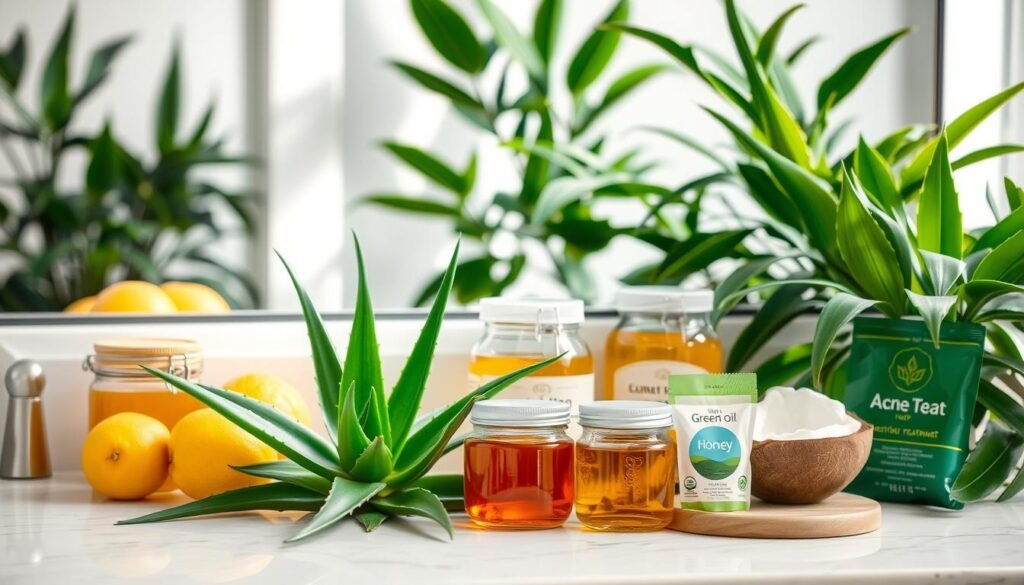Acne Scar Treatment At Home can be frustrating and leave behind scars that are hard to treat. But, there are many ways to fix acne scars, from things you can buy over-the-counter to professional treatments. No matter the type of scar, there are solutions to make them less noticeable and bring back your skin’s glow.
Key Takeaways
- Acne scars can be treated using a variety of over-the-counter and professional treatments.
- Different types of acne scars, such as atrophic, hypertrophic, and keloid, require different treatment approaches.
- Over-the-counter remedies containing salicylic acid, retinoids, alpha hydroxy acids, and lactic acid can be effective for mild to moderate acne scars.
- Professional treatments, including chemical peels, injections, dermal fillers, microneedling, laser treatment, and surgery, can address more severe or stubborn acne scarring.
- Natural home remedies, such as black seed oil, rosehip seed oil, honey, and aloe vera, can also be beneficial for acne scar reduction.
Understanding Different Types of Acne Scars
When dealing with acne scars, knowing the different types is key. Each scar type needs a specific treatment for the best outcome. Let’s look at atrophic, hypertrophic, and keloid scars.
Atrophic Acne Scars
Atrophic acne scars are the most common. They appear as small depressions in the skin. These scars happen when skin tissue is lost during healing. There are three kinds: icepick, boxcar, and rolling scars.
Icepick scars are deep and narrow. Boxcar scars are wider and shaped like a U. Rolling scars make the skin look uneven and wavy.
Hypertrophic Acne Scars
Hypertrophic scars are the opposite of atrophic scars. They form when too much collagen is made during healing. This leads to thick, raised scars that may be red or pink.
Keloid Acne Scars
Keloid scars are like hypertrophic scars but are even thicker and more noticeable. They can grow bigger than the original acne spot and may itch or hurt. These scars are more common in darker skin tones and can be hard to treat.
Knowing about these acne scar types is important for finding the right treatment. By understanding each scar’s unique features, you can choose the best way to reduce their look.
Over-the-Counter Remedies for Acne Scar Treatment At Home

Many over-the-counter ingredients can help with acne scars. Salicylic acid, retinoids, and alpha hydroxy acids are great options. They make it easy to reduce the look of scars from past breakouts.
Salicylic Acid
Salicylic acid is a top choice for over-the-counter acne scar treatment. It clears pores, reduces swelling, and fades scars. This beta hydroxy acid exfoliates the skin, removing dead cells and opening up clogged pores. This helps lessen the look of acne scars.
Retinoids
Retinoids for acne scars are also a good option. They come from vitamin A and fight inflammation, reduce acne, and help skin cells regenerate. This can help scars fade faster.
Alpha Hydroxy Acids
Alpha hydroxy acids for acne scars include glycolic acid and lactic acid. They boost skin cell turnover and fade scars. These exfoliants can also make scar tissue smoother over time.
Lactic Acid
Lactic acid for acne scars is a gentle alpha hydroxy acid. It exfoliates the skin, showing off new, healthier cells. This reduces scar discoloration and texture.
Using these over-the-counter acne scar treatment products in your skincare routine can help. You can work towards making your skin clearer and more even-toned.
Professional Acne Scar Treatments

If you’re dealing with tough or deep acne scars, you might need a dermatologist’s help. They offer special treatments that can make scars less visible and skin smoother.
Chemical Peels
Chemical peels use trichloroacetic acid (TCA) to refresh the skin and hide acne scars. They remove damaged skin layers, making scars less noticeable.
Injections
Corticosteroid injections can soften and flatten raised scars. This makes scars less noticeable and skin smoother.
Dermal Fillers
Dermal fillers fill in deep scars, making skin smooth again. These treatments work fast and can make you look younger.
Microneedling
Microneedling uses tiny needles to make small injuries on the skin. This starts collagen production, helping scars look better over time.
Laser Treatment
Laser treatments can make scars less visible by resurfacing the skin. Different lasers work for various skin types and scar levels.
Surgery
Surgery can be used for severe scars. Procedures like scar excision or subcision reshape the skin for a better look.
Always talk to a dermatologist to find the best treatment for your scars. They’ll consider your skin type, scar severity, and what you want to achieve.
Natural Home Remedies for Acne Scars

Professional treatments can help with acne scars, but some home remedies might work too. These remedies are not fully proven but show promise in making scars less visible.
Black Seed Oil
Black seed oil, also known as nigella sativa, has anti-inflammatory and healing properties. It might help reduce scars. Using this oil on scars could make them less noticeable.
Rosehip Seed Oil
Rosehip seed oil is studied for its scar treatment benefits. It might work for rosehip seed oil for acne scars too. Its vitamin C and essential fatty acids could lessen scar tissue and help skin heal.
Honey
Honey is known for fighting bacteria and healing wounds. It could be a natural fix for honey for acne scars. Honey might reduce inflammation and help scars heal, making them less visible.
Aloe Vera
Aloe vera could also help with aloe vera for acne scars. It has compounds that lessen inflammation and stop scar tissue from forming. This could improve the look of acne scars.
Trying these natural remedies might be helpful, but deep scars might need a doctor’s care for the best results.
Also Read: How Can I Create A Natural Skincare Routine At Home?
Conclusion
Dealing with acne scars can be tough, but there are many ways to help. You can try over-the-counter products with salicylic acid, retinoids, and alpha hydroxy acids. Or, you could go for professional treatments like chemical peels, injections, fillers, and laser therapy.
For minor scars, natural remedies like black seed oil, rosehip seed oil, honey, and aloe vera might work. But for deeper scars, seeing a dermatologist is best. They can create a treatment plan just for you. Knowing which treatments work best for different scars helps you take action to make your skin look better.
Getting rid of acne scars often means working with a healthcare provider. Together, you can find the right treatments. This way, you can lessen the scars and get your skin looking healthy and glowing again.
FAQs
Q: What are some effective home remedies to get rid of acne scars?
A: To get rid of acne scars naturally, you can try using ingredients like aloe vera, honey, lemon juice, and coconut oil. These natural remedies help to fade your acne scars and improve the appearance of scarring over time.
Q: What is the best treatment for acne scars at home?
A: The best treatment for acne scars at home often includes natural ingredients such as vitamin E oil, tea tree oil, and baking soda. Regular application of these treatments can help reduce the appearance of scarring.
Q: Can I treat acne while using acne scar removal products?
A: Yes, you can treat acne while using acne scar removal products. However, it’s important to choose treatments that do not irritate your skin further. Look for gentle acne treatment options that complement your scar treatment regime.
Q: How can I remove acne scars effectively?
A: To remove acne scars effectively, consider using a combination of natural remedies and over-the-counter products like adapalene gel acne treatment. This helps treat acne and fade your scars simultaneously.
Q: Are there specific treatments for acne scars I should consider?
A: Yes, there are several treatments for acne scars, including chemical peels, microdermabrasion, and laser therapy. These treatments can significantly reduce acne scars and improve skin texture.
Q: What are the different types of acne scars?
A: The different types of acne scars include ice pick scars, boxcar scars, rolling scars, and raised acne scars. Understanding the type of scar can help in choosing the most effective treatment option.
Q: How can I prevent acne and reduce the appearance of scarring?
A: To prevent acne and reduce the appearance of scarring, maintain a good skincare routine, stay hydrated, and avoid picking at pimples. Keeping acne under control is essential in preventing scars from forming.
Q: Can I use adapalene gel for both acne treatment and scar removal?
A: Yes, adapalene gel is an effective acne treatment that can also help improve the appearance of acne scars. It promotes cell turnover and can help fade dark marks left by acne.
Q: What natural acne scar removal methods are recommended?
A: Natural acne scar removal methods include using products like lemon juice, honey, and aloe vera. These ingredients can help lighten scars and improve skin texture when used consistently.
Q: How long does it take to see results from acne scar treatments?
A: The time it takes to see results from acne scar treatments can vary. Typically, natural remedies may take several weeks to show improvement, while more intensive treatments like laser therapy can yield quicker results.




